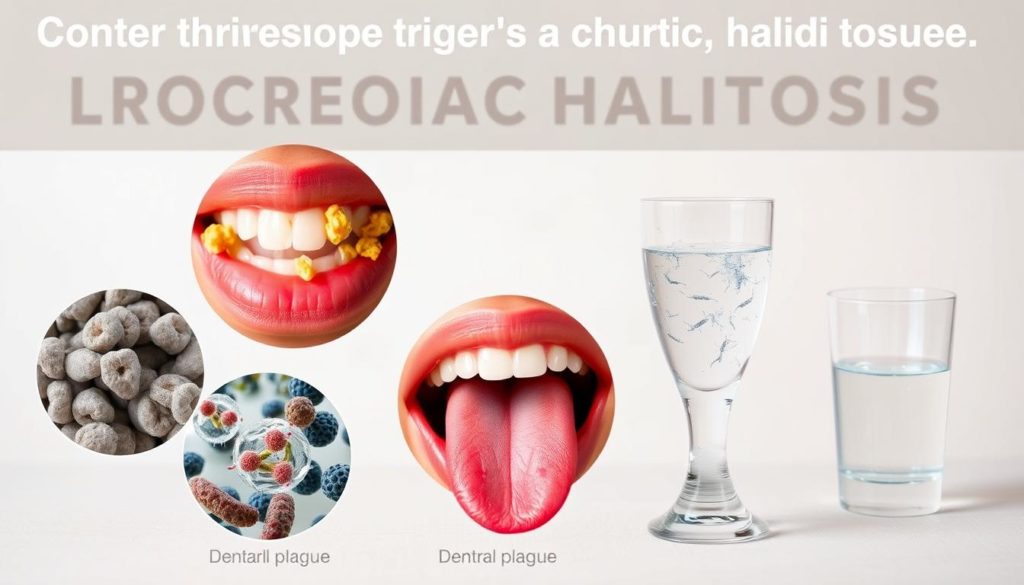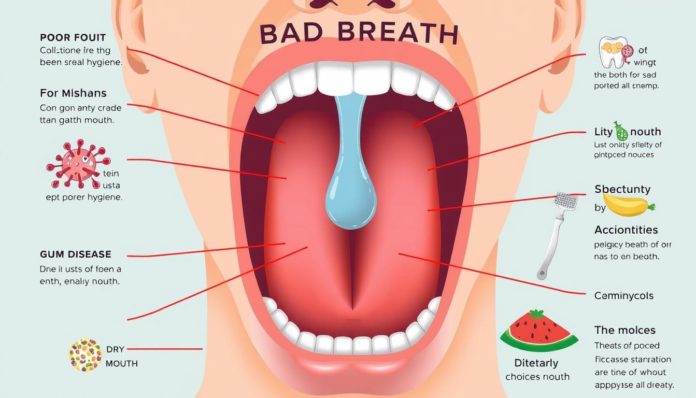Bad breath, or halitosis, affects about 25 percent of people. It’s common but can make you feel embarrassed. Knowing why it happens can help you beat it.
Poor oral hygiene is a top cause of halitosis. Yet, bad breath might also mean there’s a health issue. Good oral care is key. Brush, floss, and see your dentist to keep breath fresh.
Still have bad breath after all that care? It might be time to see a doctor. A quick test: lick your wrist, then sniff it. It’ll give you a clue about how your breath smells.
Introduction to Bad Breath
Bad breath, or halitosis, is a common issue that can cause a lot of worry. It ranks as the third leading reason for dental visits, coming after tooth decay and gum disease. There are many causes of chronic bad breath, and dealing with it can be complex.
- Oral Hygiene: It’s very important to keep your mouth clean. Brushing your teeth twice a day and flossing can greatly lessen bad breath.
- Lifestyle Adjustments: Staying away from tobacco and drinking water all day can fight dry mouth, which often leads to bad breath.
- Professional Healthcare: If bad breath doesn’t go away, it’s smart to see a healthcare professional. They can check for other possible health issues.

Oral Hygiene Impact on Breath
Keeping your mouth clean is key to having fresh breath. Good dental habits fight the main causes of bad breath. This helps lower the chance of getting halitosis.
The Importance of Brushing and Flossing
Brushing and flossing tackle bad breath head-on. Brushing clears away food and plaque on your teeth. Flossing gets between teeth, reaching spots brushes can’t. Both are critical in fighting off the causes of bad breath.

How Plaque and Tartar Contribute to Bad Odors
Plaque and tartar are homes for smelly bacteria. These bacteria feast on leftovers in your mouth, making bad smells. Getting regular teeth cleanings and practicing good oral hygiene are key steps to fight this.
Proper Care for Dental Appliances
Dental appliances like dentures need careful cleaning to avoid bad smells. If not cleaned well, they can gather bacteria and old food. Making sure they fit right and are cleaned often is crucial for keeping your breath nice.
Causes of Bad Breath
Knowing why bad breath happens is key to dealing with it. We’ll look at the main causes, like how taking care of your teeth affects it and what chronic issues come into play.
Bad breath comes from many places. Not cleaning your teeth well leads to left-over food in your mouth. This makes bacteria grow and smell bad. Brushing and flossing well stops this problem.
Things that cause long-term bad breath include smoking, what you eat, and some health issues. Smelly foods like garlic and onions are famous for making breath stink. Lung infections and stomach problems can also make your breath smell.
Smoking makes your mouth dry and leaves behind nasty smells from nicotine. Diseases like diabetes, liver, and kidney problems can also change how your breath smells. This happens because your body handles things differently.
Doctors test for bad breath by checking for smelly sulfur compounds in your breath. These are made by mouth bacteria and are easy to spot by others.
Here’s a table showing common reasons for bad breath and how they affect your mouth:
| Cause | Description |
|---|---|
| Poor Oral Hygiene | Leads to plaque buildup and bacterial growth |
| Tobacco Use | Nicotine residues and dry mouth contribute to bad breath |
| Dietary Choices | Foods like garlic/onions cause immediate and strong odor |
| Medical Conditions | Respiratory infections and digestive disorders impact breath |
| Medications | Certain drugs cause dry mouth, leading to bad breath |
To manage bad breath well, you need to look at everything. This includes getting any health issues treated, eating better, and taking care of your teeth every day.
Tobacco and Its Effects on Breath
Using tobacco can harm your oral health, leading to lasting bad breath. It’s crucial to know how Tobacco Breath Impact works if you want better breath and dental care. Let’s look at what causes the bad breath seen in tobacco users.
The Lingering Smell of Tobacco Products
The strong smells from cigarettes and cigars stick to your mouth’s surfaces. This smell is a top reason for Factors Behind Bad Breath in those who smoke. Tobacco smoke’s chemicals soak into the mouth’s lining, causing a hard-to-remove, bad odor.
The Association Between Smoking and Gum Disease
Smoking also raises the chance of getting gum disease, which leads to bad breath. Tobacco’s harmful elements weaken the immune system, allowing harmful bacteria to grow. This bacteria causes gum disease, which worsens breath and oral health.
Staying away from tobacco can improve both your breath and overall health. The Tobacco Breath Impact is complex, affecting direct smells and causing problems like gum disease.
Food-Related Factors Behind Bad Breath
Bad breath from food is common and depends on what we eat. Some foods have strong effects on how our breath smells.
Odor-Causing Foods Like Garlic and Onions
Garlic and onions can cause breath issues. They have sulfur compounds that go to our lungs after digestion. This makes our breath smell bad when we exhale.
Food Particles and Decomposition
Food stuck in teeth also causes bad breath. It breaks down over time and lets out smelly compounds. This makes breath odor worse.
| Food Type | Odor Quality |
|---|---|
| Garlic | Pungent, pervasive |
| Onion | Sharp, lingering |
| Cheese | Strong, musty |
| Fish | Briny, lasting |
The Role of Dry Mouth in Halitosis
Dry mouth, also called xerostomia, is a key factor in causing bad breath. Saliva keeps the mouth clean by washing away odor-causing bits. If saliva production drops, these bits stick around, causing bad breath.
Several things can lead to dry mouth. These include certain meds, life habits, and health conditions. Drugs for high blood pressure and allergies can make the mouth drier, worsening breath. Also, smoking and too much alcohol can lower saliva, making the problem worse.
Dealing with dry mouth and bad breath can be effective with the right steps. Drinking enough water and staying away from drying substances like caffeine and tobacco help a lot. Keeping up with great oral hygiene also plays a key role in fighting dry mouth smell.
- Drink water regularly all day to stay hydrated.
- Steer clear of dehydrating drinks, like coffee and booze.
- Chewing sugar-free gum helps make more saliva.
- Use a saliva replacement if your dentist suggests it.
| Factor | Impact on Dry Mouth |
|---|---|
| Medications | They lower saliva making, which increases dryness and bad breath. |
| Alcohol Consumption | Makes the mouth dry, lowering saliva and causing more odor. |
| Smoking | Lowers saliva and leaves tobacco smell, adding to bad breath. |
| Hydration | Drinking water keeps the mouth moist and healthy. |
| Oral Hygiene | Proper cleaning removes bits and bacteria, reducing bad breath. |
Knowing how dry mouth ties to bad breath is important for oral health. Visit your dentist often, drink plenty of water, and avoid drying your mouth for fresh breath.
Chronic Medical Conditions Leading to Bad Breath
Bad breath might mean health problems exist. Many chronic conditions can cause halitosis, Showing the need to understand their effects on breath.
Diabetes and Ketoacidosis
Diabetes can produce a fruity-smelling breath. This happens especially if it’s not well-controlled. Keeping blood sugar in check helps avoid these Chronic Halitosis Triggers.
Liver and Kidney Diseases
Liver and kidney problems can make breath smell bad. If they can’t remove toxins well, a “fishy” odor appears. Regular check-ups and treatment are key.
Respiratory Infections and Conditions
Respiratory issues can cause bad breath too. Things like sinusitis or pneumonia create an unpleasant smell. Treating these quickly helps lower the risk of lasting bad breath.
| Medical Condition | Associated Symptoms | Impact on Breath |
|---|---|---|
| Diabetes and Ketoacidosis | High blood sugar, ketone production | Fruity odor |
| Liver Disease | Jaundice, fatigue | Fishy odor |
| Kidney Disease | Edema, reduced urine output | Ammonia-like breath |
| Respiratory Infections | Cough, nasal discharge |
Finally, addressing these Chronic Halitosis Triggers properly can make breath better. It also boosts overall health.
Digestive Issues and Breath Odor
It’s important to know how digestive health affects bad breath to manage halitosis. Gastrointestinal problems often lead to breath odor.
GERD and Acid Reflux
Gastroesophageal Reflux Disease (GERD) is a common issue that affects breath. The GERD Halitosis Connection happens when stomach acids go up into the esophagus. This brings up undigested food particles. Besides causing heartburn, it makes the breath smell bad because of the foul odors from regurgitated acids. Handling GERD well can help lessen this issue.
Stomach Ulcers and H. pylori
Stomach ulcers, often due to Helicobacter pylori (H. pylori) infection, link digestive health with bad breath. This bacteria breaks down food in the stomach. It releases sulfur compounds that make breath smell unpleasant. Treating these ulcers and getting rid of H. pylori can make breath much better.
Impact of Hygienic Habits Influence the Breath
Good oral hygiene is key to keeping your breath fresh. It plays a major role in fighting bad breath. Regularly brushing and flossing are important, but other habits matter too.
Changing your toothbrush often is one such habit. Overused toothbrushes can gather harmful bacteria. Health experts suggest getting a new toothbrush every three to four months to avoid bacteria build-up.
Using the right mouthwash is also crucial. Alcohol-based mouthwashes can cause a dry mouth, leading to bad breath. It’s better to use alcohol-free options for lasting Dental Health Effects.
Eating right helps your breath too. Try to eat less sugary and strong-smelling foods. Sugar can worsen plaque, harming your dental health. Foods like garlic and onions stay in your mouth and make your breath smell. Eating things like apples and carrots can help keep your breath fresh.
| Hygienic Habit | Impact on Breath |
|---|---|
| Regular Toothbrush Replacement | Reduces bacterial buildup for fresher breath |
| Avoiding Dryness-Inducing Substances | Prevents dry mouth, a common cause of bad breath |
| Maintaining a Balanced Diet | Minimizes plaque buildup and reduces odor-causing compounds |
Adding these habits to your daily life is great for your breath. They help keep your dental health and breath smelling good. These practices are essential for good oral hygiene.
Medications and Chemical Breakdown
Medications are key to managing health but can sometimes cause bad breath. Some drugs lead to dry mouth, which is linked to halitosis. We will explore how certain medicines and vitamins impact breath quality.
Common Medications Causing Dry Mouth
Many drugs, like antihistamines, antidepressants, and blood pressure medications, cause dry mouth. This condition reduces saliva, which normally cleans our mouths. Thus, bacteria grow and create bad smells. Learning about Medication Effects on Breath helps find other options to lessen these side effects.
Effect of High-Dose Vitamins
Too much of certain vitamins, like B vitamins and vitamin D, leads to bad breath. As these vitamins break down, they release smelly compounds. Talking to doctors about Halitosis Reasons due to vitamins can help. They can advise how to avoid bad breath without losing the vitamins’ benefits.
Rare Causes of Bad Breath
While it’s well-known that not brushing your teeth, eating certain foods, and having a dry mouth can lead to bad breath, there are less common causes too. These lesser-known causes need special medical care and specific treatments to be managed well.
Metabolic Disorders
Metabolic disorders, like diabetes, can sometimes cause bad breath. If diabetes isn’t managed, it can lead to ketoacidosis. This makes the body produce ketones, which can make your breath smell bad. Knowing about these unique causes of bad breath can help in treating the real problem, improving life quality.
Conditions Like Fish Odor Syndrome
Fish odor syndrome, or Trimethylaminuria, is another rare cause. This genetic problem stops the body from breaking down a certain chemical, leading to a strong, fishy smell in sweat, urine, and breath. Even though it’s rare, knowing about it is important for the right medical response.
These rare conditions, although uncommon, are important to understand when dealing with bad breath. Getting diagnosed early and getting the right treatment can greatly help improve oral health and overall happiness.
FAQ
How does oral hygiene impact bad breath?
Good oral hygiene is vital for controlling bad breath. Brushing your teeth twice a day, flossing, and cleaning any dental appliances are key. They help remove food bits and decrease plaque, which cause bad breath.
What are some common causes behind bad breath?
Poor dental care, using tobacco, certain foods, having a dry mouth, and medical conditions can cause bad breath. Seeing your dentist regularly and keeping your mouth clean are important for prevention.
How does smoking affect breath?
Using tobacco can give you bad mouth odors and raise your risk of gum disease. This can make your breath smell worse. Quitting smoking is important to stop breath issues caused by tobacco.
What foods are known to cause bad breath?
Garlic and onions have compounds that cause bad breath. Food stuck between your teeth can also rot and make your breath smell bad.
How does dry mouth lead to bad breath?
Saliva cleans your mouth, but having a dry mouth can make bad odors worse. Drinking more water and avoiding things that dry out your mouth can help.
What chronic medical conditions can lead to bad breath?
Bad breath can be caused by diabetes, liver and kidney diseases, and breathing infections. Getting treatment for these conditions is crucial.
Can digestive issues cause bad breath?
Yes. Problems like GERD and stomach ulcers from H. pylori bacteria can make your breath smell. Treating these digestive issues can help.
How do hygienic habits influence breath freshness?
Changing your toothbrush regularly, avoiding things that dry out your mouth, and eating less sugary or smelly foods can make your breath fresher.
Can medications cause bad breath?
Yes. Some medicines can dry out your mouth or make your breath smell as they break down. Talking to your doctor about these side effects can help.
Are there rare causes of bad breath?
Less common conditions like unmanaged diabetes or fish odor syndrome can cause unique bad breath. These conditions need special medical care and treatment.


